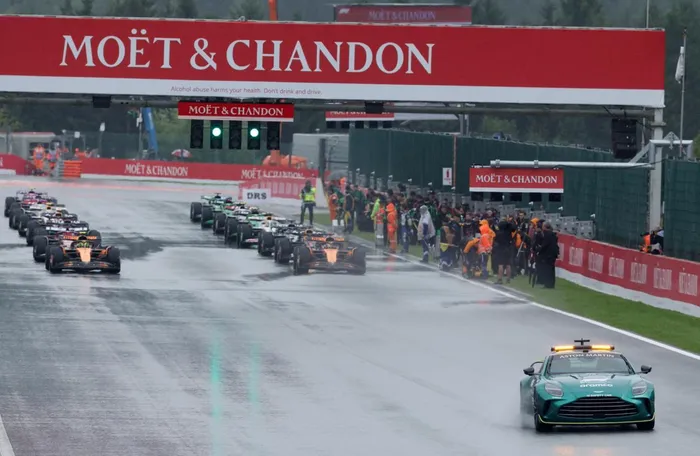
The Belgium GP start behind the safety car last week Sunday was perhaps too conservative. Photo: EPA
Image: EPA
It’s strange to look back at the 1990s and realise that, even here on the tip of Africa, everyone knew who Wayne Gretzky was. The same was true — even more profoundly — of Ayrton Senna. These were names that transcended borders and sports, legends shaped not just by talent, but by the drama and danger that defined their eras.
Back then, the World Wide Web was still an undiscovered country, and the world felt both larger and more connected in unexpected ways. Brazilian Senna wasn’t just a F1 driver — he was a global icon, forged in a time when the sport still had real teeth.
I was still a youngster, and although I couldn’t fully comprehend Senna’s death, even I understood, as a 10-year-old in 1994, that the world had lost a once-in-a-generation talent.
In the aftermath, F1 was forced into a period of serious self-reflection — one that still echoes today. The sport has become far safer, thanks to rule changes that prioritise both driver and spectator welfare. Trackside technology has also come a long way.
Chassis that absorb impact, cockpits that cocoon the driver, HANS devices, improved barriers, and safety-focused circuit designs have all contributed to a more secure racing environment. The introduction of the Halo alone has already saved lives.
Still, tragedies happen. The deaths of Jules Bianchi in 2015, Anthoine Hubert in 2019, and Dilano van ’t Hoff in 2023 are sobering reminders that Formula 1 — and its feeder series — remain inherently dangerous.
Nonetheless, the recent aversion to racing in wet conditions suggests the sport’s caution is tipping into conservatism.
Today, F1 still sells the illusion of speed and danger, but all too often pulls back when weather — that most elemental of variables — threatens the spectacle. In doing so, the sport risks sanitising the very edge that once made it so captivating.
The most vivid recent memory of wet-weather brilliance was Pierre Gasly’s breakthrough at Monza in 2020. I still remember him staring almost in disbelief at his winner’s trophy, post-race and post-podium — as if the magnitude of what he had just achieved hadn’t quite sunk in. He had survived the chaos that only a slippery track can conjure to claim an unforgettable victory.
The opposite is also true. At the 2023 Russian Grand Prix in Sochi, the chequered flag beckoned for Lando Norris. But a flash storm, combined with a string of poor decisions, saw the win slip from his grasp. His reward was the cruel nickname “No Wins Norris” — a painful reminder of how quickly fortunes can change in the wet.
Rain has always been the great equaliser — a crucible for nerve and instinct. Senna’s legendary charge at Donington Park in 1993 – the Lap of the Gods – remains one of the most sublime laps in F1 history. Lewis Hamilton’s wet-weather heroics — particularly at Interlagos in 2011 — further prove that racing in the rain, while risky, is often the making of champions.
So, it was with a snort of exasperation that one watched last weekend’s Belgian Grand Prix delayed by more than an hour due to rain. Max Verstappen was among those unimpressed. He argued the conditions were manageable and the delay overly cautious.
“We barely did any wet laps in the end,” he said. “Which in general, I think is a shame.”
He added that starting behind the safety car would have allowed the track to improve naturally — as it has countless times before.
Fans watch F1 to see the best drivers in the world battle not just their rivals and machines, but the track and the weather — to dance on the knife-edge between control and catastrophe at 300km/h.
To completely sanitise the sport by eliminating the unpredictable drama of wet racing — and replace it with clinical, clockwork consistency — is to strip away something essential. F1 doesn't need more caution. It needs to remember what made it unforgettable in the first place.
Will we ever see the like of Senna at Donington in ’93 again? Right now — like Gretzky, like the fearless F1 of old — it feels consigned to the past.
Related Topics: